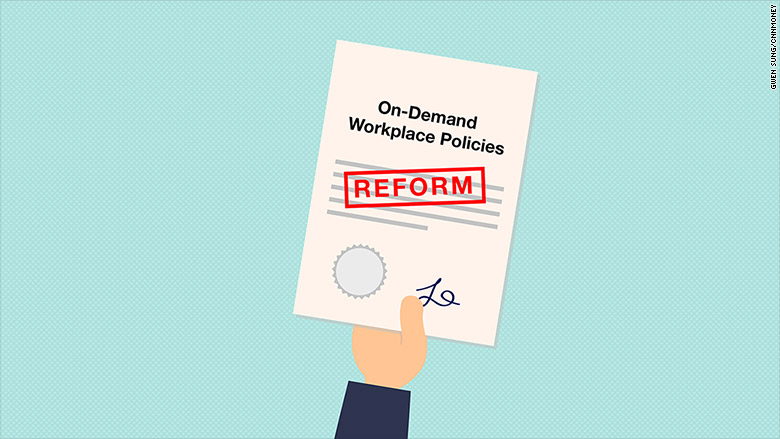
It's time for policy to catch up with the Uber economy.
That's according to a new report from the National Employment Law Project, an employment rights advocacy group.
Uber, like many other on-demand startups, relies on contract workers to perform services.
It's a model that has come under fire. While lauded by some for giving workers flexible hours, there's a lot of downside. Independent workers aren't entitled to minimum wage, overtime compensation, unemployment insurance or protection from workplace discrimination. They also aren't entitled to benefits and don't have the right to join a union.
A growing number of lawsuits have called the on-demand model into question.
"The growing concerns about workers made it urgent for us to suggest some policy standards," NELP Deputy Director Rebecca Smith told CNNMoney.
After all, on-demand workers are a sizable piece of the U.S. workforce. A recent study found that 34% of U.S. workers are freelancers. Meanwhile, 40% of those surveyed said they worked for two or more companies -- and half said they struggled to find enough work.
According to NELP senior staff attorney Sarah Leberstein, who co-authored NELP's study, the workforce looks "a lot more like turn of the century sweatshops."
Here are some of the most pressing issues, according to the new report from NELP.
1. Lack of benefits
There are two classifications for workers: employees and independent contractors (sometimes known as 1099 workers because of the tax forms they fill out). Independent contractors are cheaper for companies to hire -- and they don't receive benefits like health insurance, 401(k), paid time off or unemployment insurance.
The Social Security Act, though, requires that companies pay Social Security and Medicare taxes for some of these contract workers -- those characterized as "statutory employees." These employees are independent contractors who don't meet formal employee standards but fall within four specific categories. Right now, this doesn't include on-demand economy workers -- but policymakers could change this.
There are other existing laws that address everything from wage protection to sick days to retirement savings that could be used as a model for federal laws. That includes tapping into existing legislation like the Fair Labor Standards Act or pooling 1099 workers' pay into a central fund that could be tapped for sick leave.
2. Unable to unionize
NELP says it's essential for on-demand contract workers to be able to band together and fight for better wages and treatment. Currently, independent contractors aren't covered under the National Labor Relations Act that protects workers in using their collective bargaining power.
Maryland's Montgomery County, for example, passed an ordinance to establish a taxi worker co-op. This could be used as model for other communities.
3. No privacy protections
Tech's influence on the new on-demand workforce can't be ignored, according to the report. As companies like Uber and Handy rely on technology to connect customers with their services, that also means they're collecting personal information and geolocation data on workers.
When these companies don't specify workers' rights, they could be subject to intense scrutiny -- or even exploitation if companies decided to sell the data.
As an example, the authors noted one on-demand cleaning company that used geolocation to make sure workers weren't sitting down on the job.
"It's certainly an issue for workers," said Smith. "It's an area we haven't paid enough attention to yet."




